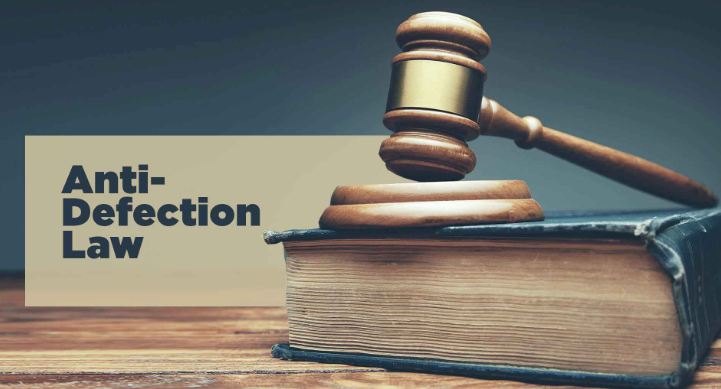Anti-Defection Law
Syllabus:
- GS 2: Consitutional Amendments
Why in the News?
The anti-defection law has gained prominence due to recent controversy over changes in party affiliation by MPs and MLAs, delays in deciding cases and demands for amendments to ensure political stability and integrity.
Introduction
- Anti-Defection Act, introduced in 1985, aims to prevent party swings and shifts in parliament which tend to destabilize governments and undermine democratic values.
- Although relatively successful, the law’s limitations and implementation challenges underscore the urgent need for reform in order to strengthen its effectiveness and maintain legal integrity.
Indian Politics and Anti-defection
- Issue of defection in India dates back to the early years after independence.
- In the 1st few decades, many elected representatives changed parties, often leading to the collapse and re-establishment of governments.
- “Aaya Ram, Gaya Ram” Incident: The slogan “Aaya Ram, Gaya Ram” originated from an incident in Haryana in the 1960s where MLA Gayalal changed parties several times in a day.
- This incident highlighted the need for immediate legislation to prevent party changes.
52nd Amendment
- To prevent secession, Parliament through the 52nd Amendment enacted the Anti-Defection Act, the 10th Schedule was added to the Constitution during the prime ministership of Rajiv Gandhi.
- This law sought to ensure the stability of governments and ensure party loyalty.
Disqualification
- Laws says, MPs and MLAs can be excluded if they are:
- He voluntarily left his party.
- They voted against their party’s whip on important votes like motions of confidence or budget approval.
Amendments
- The original rules allowed one-third of party members to resign without eligibility, which encouraged mass defection.
- 91st Amendment (2003): To deal with this, the 91st Amendment raised the requirement that two-thirds of the group members agree to “join” to avoid disqualification.
- This gave people limited small escapes and improved team discipline.
Implementation challenges
- Delayed decision-making: Advocates often take months or even years to decide cases involving defectors, allowing defectors to maintain their status. This delay destroys the purpose of the law.
- Discretionary Power of the Speaker: The Speaker or Chair has discretionary power in cases involving disqualified persons without a definite time limit, which leads to criticism and the possibility of abuse of power.
Party Whips
- Concerns about transparency: Whips by party to ensure critical attention is sometimes lacking in clear communication.
- Doubts arise as to whether members have been informed of party positions, complicating matters of suspension.
- Limitations on judicial review: Defection decisions are open to judicial review, courts have been reluctant to intervene while respecting constitutional independence which will help in timely decisions and limiting the bias.
Proposed Reforms
- The absence of a prescribed timetable for defection cases resolution has resulted in delays and abuse of power by the Speaker or Chairman, which may undermine the purpose of the bill
- Proposal of 4-week limit: A four-week time limit should be introduced for decisions in defection cases. If the Chairperson or Speaker fails to reach a decision within this period, absconding members may be suspended automatically.
- Amendment impact: Establishing this timeline would encourage accelerated decision-making, reduce undesirable decisions, and preserve the integrity of the legislative process by limiting political bias.
Encouraging transparency in Whip
- Often, the lack of transparency in the issuance of the party whip leads to disputes over whether members have been properly informed.
- Political parties may issue whips through newspapers or electronic communications to ensure that all members are clearly notified.
Recommendation
- Speaker’s Power: Kesham Meghchandra Singh vs. Hon’ble Speaker, Manipur Legislative Assembly & Ors. In the (2020) case, the Supreme Court suggested the creation of an independent body to replace the Speaker to decide cases of disqualification.
- However, the role of the Speaker is important in safeguarding the integrity of parliament.
- Rather than marginalizing the Office of the Speaker, reforms should focus on increasing transparency and accountability.
- Reports: recommendations of Dinesh Goswami Committee (1990), Hashim Abdul Halim Committee (1994, 2003), Law Commission Reports Nos. 170 and 255 (1999, 2015), should be considered by Government.
Strengthen Anti-defection law
- Historically, anti-defection laws have contributed to government stability by discouraging defections, and preserving voter mandates.
- Variations in the implementation of the law have emerged, underscoring the need for flexibility to make it more effective and appropriate.
- Amendments to the Tenth Schedule are necessary to implement the “One Nation, One Election” policy that promotes equality in the electoral process.
- The law will better protect democratically elected voters by strengthening party integrity and discipline.
- Leaders like Narendra Modi and Rahul Gandhi have prioritized this issue to ensure a strong and fair democratic process.
- Modernizing the laws would support the integrity of parliamentary democracy, and adapt to the evolving political environment well.
Conclusion
The anti-defection law must be strengthened with urgent reforms to maintain electoral integrity and guarantee party loyalty. This will strengthen India’s democratic process and provide political stability in a changing environment.
Source: The Hindu
Mains Practice Question:
Evaluate the proposed amendments to the anti-defection law and their possible implications for Indian politics. How can these support democratic values?





